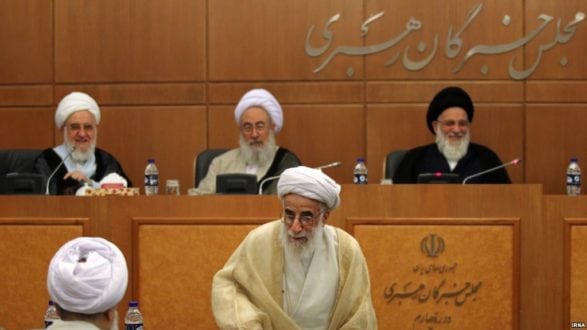Al-Monitor – Harsh diatribes and ruthless rhetoric are heralding raucous Iranian parliamentary elections, scheduled for Feb. 21. The preelection front line opened with a clash between President Hassan Rouhani — a moderate and Reformist — and hard-line cleric Ayatollah Ahmad Jannati, who chairs the powerful Guardian Council, which has the final say in most of Iran’s electoral processes.
The 12-member council is made up of six clerics appointed by the supreme leader and six lawyers proposed by the judiciary chief and approved by the Iranian parliament. Traditionally dominated by conservative figures, the council has faced longstanding criticism over its perceived double standards and its interference in election results. More specifically, the council’s vetting process for electoral candidates is seen as undemocratic, as the council exercises a free hand in disqualifying candidates. In past elections, serious concerns have been raised that the practice limits the number of candidates to a restricted few favored by the hard-line camp.
The contentious issue resurfaced when, in a speech Nov. 12, Rouhani said, “Let’s give people some power of choice. Allow them to at least decide the color of the commodity on their own.” This was an implicit message to the council, and it was well received by the chairman.
Jannati’s harsh response slammed Rouhani over “uproar and controversy” ahead of parliamentary elections. “Such tactics,” he added, “are aimed at distracting people from the key problems.” The influential cleric did not elaborate on those “problems,” but critics from his camp have come down on the Rouhani administration over its poor economic performance, among other perceived inadequacies.ALSO READARCHAEOLOGYBasra Museum struggles to keep Iraq’s heritage at home
The barrage of attacks from the 92-year-old politician did not end there. He accused the Rouhani administration of “interference” in the election process and “violating people’s right” to choose. Under the Iranian Constitution, the actual voting process in individual constituencies is executed by governors and governor-generals appointed by the Interior Ministry. Jannati suggested that the Rouhani administration has replaced the decision-makers in many provinces in order to usher its favored candidates into parliament.
“Unfortunately, we have been witnessing widespread replacements of governors and governor-generals,” he said. “This is probably [the administration’s] effort to align the new officials with its agenda. Many of these replacements are about partisanship.”
According to an August report from the conservative daily Farhikhtegan, such replacements have accelerated in the past two years in favor of the Reformist camp. Of the 31 governor-generals, the report said, only one hails from the conservative camp.
Addressing Jannati’s criticism, Interior Minister Abdolreza Rahmani Fazli defended the policy: “As I have said it before, we will make such replacements even on the eve of the elections if need be.”
The push and pull continued after Mohammad Hassan Sadeghi Moghadam, the Guardian Council’s deputy for electoral affairs, justified the practice of disqualifying candidates as the “guarantor” of healthy elections. “We will not back down from the vetting process, because it is the council’s legal responsibility,” he said.
It is not clear how the tug of war between the Rouhani administration and the Guardian Council will play out by election day. But the council already has a proven record of purging political figures as senior as former presidents. Akbar Hashemi Rafsanjani and Mahmoud Ahmadinejad, who both served two terms in office, were respectively disqualified before the 2013 and 2017 presidential polls after they fell from grace.Found in:COURTS AND THE LAW
 Shabtabnews In this dark night, I have lost my way – Arise from a corner, oh you the star of guidance.
Shabtabnews In this dark night, I have lost my way – Arise from a corner, oh you the star of guidance.



